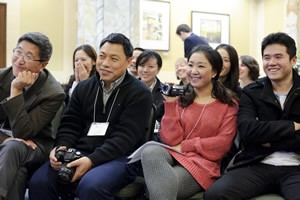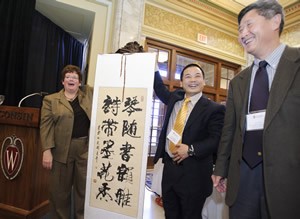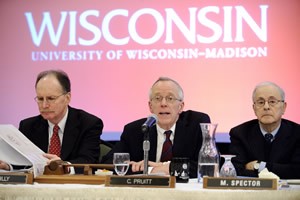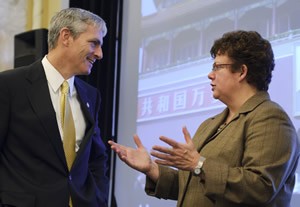MADISON, Wis. –University of Wisconsin-Madison’s growing relationship with China promises benefits for students, the university, and the State of Wisconsin, Chancellor Biddy Martin told the UW System Board of Regents on Thursday.
In building stronger ties with China, “We have multiple aims,” Martin said, including “improving the quality of the education we offer … by ensuring that our students have opportunities to learn more about this important part of the world.”
The State also stands to benefit from UW-Madison’s increased attention to China, she said, by its spreading the word of Wisconsin’s assets to investors from East Asia. “The best-kept secret when it comes to research and technology development is right here in Wisconsin,” Martin said.
Martin has travelled to China twice in the past year as part of ongoing efforts to enhance collaboration with Chinese universities, bring more Chinese students to UW-Madison, and enhance the worldwide visibility of UW-Madison.
Currently, UW-Madison has about 2,000 degree-seeking students enrolled from China, Hong Kong and Taiwan. Each semester, about 300 students study Chinese on the campus, and about 180 UW-Madison students study in China.

Chinese student athletes, who were part of UW-Madison’s new Chinese Champions Program, look on during the Regents meeting.
UW-Madison senior Matt Payne, who is majoring in Chinese and economics, shared with Regents some of his experiences in studying in China, from taking classes to traveling in Inner Mongolia and sleeping in the Gobi Desert. He said his decision to study Chinese reflects a recognition that global perspectives are here to stay. “My competition isn’t just sitting next to me here… but in the lecture halls in Beijing and Shanghai,” he said. He called China “the goldrush of the 21st century.”
Gilles Bousquet, Dean of the Division of International Studies, told Regents that there is a very strong appeal in China for the Wisconsin Idea, and the notion that the university’s resources can be harnessed for the larger public good. “That really resonates with the Chinese,” he said.
UW-Madison political science professor Edward Friedman, an expert on Chinese politics, told Regents that “China is another universe today,” with a booming economy. “If you care to be the best of the best, the only best way to do that is to plug in with the people who are on the frontier, and that is what we’re doing,” he said. “China is complex and contradictory, but it’s the right place to go.”
Regents also recognized the first group of Chinese athletes to come to UW-Madison as part of the new Chinese Champions Program. UW-Madison’s Li Li Ji, a professor of kinesiology and director of the program, presented Certificates of Excellence to nine visiting Olympic- and world-class Chinese athletes and coaches, representing a variety of sports from short track speedskating to gymnastics to sprint canoe.
Presidents’ reports
In his report to the Board, Regent President Pruitt updated the Regents on meetings that UW staff members have been scheduling with the new state legislative leaders. Pruitt noted that the UW System continues to reach out to both new and re-elected legislators on both sides of the aisle to convey its continued interest in working together on higher education issues and how the University can play a vital role in the state’s economic recovery.
Pruitt and President Reilly also reported on ongoing advocacy efforts with community and business leaders on behalf of the university.
As part of his report, Reilly updated Regents on the concluding session of the Wisconsin Economic Summits, for which UW was one of several conveners.
“The final ‘Be Bold’ Prosperity Strategy that resulted from the summits included many recommendations that align very nicely with our Growth Agenda, our call for new flexibility, and the need for higher education to play a central role in boosting the state’s economy,” Reilly said.
He added that UW chancellors, provosts, faculty, and staff participated in every planning meeting and every summit. “That speaks to how seriously we take our role in economic development, and how strongly we want to facilitate positive change,” Reilly said.
- Read President Reilly’s “News from around the UW System“
UW System eCampus presentation
The Board was provided with an overview of the recently launched UW System eCampus website. As detailed in a Nov. 10 UW System news release, this new website provides greater access to online education, which is vital part of strategic efforts to grow the number of degree-holders in the state.
In leading the presentation, Marv Van Kekerix, interim Chancellor of UW Colleges and UW-Extension, called the eCampus initiative “a new comprehensive approach to online learning. “It serves as a gateway to a real University of Wisconsin education and experience that fits into people’s real lives,” Van Kekerix said.
Rovy Branon, interim associate dean of online learning for UW-Extension’s division of Continuing Education, Outreach and E-Learning, reported that since the site’s launch, it already has had nearly 6,000 unique visitors and almost 100 potential students have contacted student services.
Education Committee
Education Committee gets update on Madison Initiative for Undergraduates
UW-Madison Provost and Vice Chancellor for Academic Affairs Paul M. DeLuca, Jr., provided the committee with an update on the Madison Initiative for Undergraduates: “Taking us in new directions.”
The initiative, enacted in April 2009, was funded with a tuition increase. Half of the money goes to provide need-based financial aid, which has gone to 749 students in 2010-2011. About $13 million has been awarded to fund faculty hiring in bottleneck courses, improve advising and increase the number of learning communities and first-year interest groups.
DeLuca said that before the Madison Initiative, UW-Madison was “boxed into a corner” because it did not have the resources necessary to provide the educational experience it and students expect.
The program awarded $1.8 million to improve academic and career advising, including setting up Advisor Notes, an online note-taking and sharing system that now serves more than 90 percent of freshmen.
“This program is a prototypical example of what expanded resources can do,” DeLuca said.
Funding proposals were selected in a competitive process based in large part on the recommendation of a student advisory board. The process for awarding the third round of projects is currently underway.
Impact of student success programs on underserved populations discussed
As part of the university’s commitment to the More Graduates initiative, the committee discussed high-impact educational practices, particularly those targeting historically underserved student populations. High impact practices include first-year seminars; learning communities; undergraduate research; writing-intensive courses; service and community-based learning; among others.
At UW-Madison, there is evidence that the benefit of being enrolled in a first-year interest group lasts well beyond the first semester on campus, resulting in higher GPA and graduation rates, said Aaron Brower, vice provost for teaching and learning.
“These programs help everyone, but they traditionally help those students who typically underperform,” Brower said.
The primary challenge is the population most likely to gain the greatest benefit from high-impact practices – underrepresented minorities and low-income students – is also the population least likely to take advantage of such practices.
UW-Eau Claire now recruits underrepresented students to join its honors program and engages them in undergraduate research projects, experiences that improve graduate rates and increase chances of completing a degree in four years.
UW institutions are already tracking student access to and participation in high-impact practices as part of their annual accountability reports. UW System is expected to launch a newly developed website within the next few months to collect and disseminate HIPs UW institutions offer that have been proven to be especially effective.
Committee members acknowledged high-impact practices are resource-intensive. UW System’s 2011-13 Biennial Budget proposal includes a funding request for strategies that would address retention and student success, as part of its Growth Agenda/More Graduates initiative.
Annual Program Planning and Review
In presenting the Annual Program Planning and Review Report, Associate Vice President Stephen Kolison told the Committee that despite budgetary constraints, UW System institutions creatively expanded their program arrays in 2009-10 by tailoring the implementation of new programs to the changing economic climate, shifts in student demand, and emerging market niches in the higher education market.
The additions include online degree options for students who are place-bound; evening and weekend programs to serve the needs of working adults; and degree-completion programs that reach out primarily to transfer students who have already accumulated a number of credit hours towards a degree. Articulation agreements with two-year institutions within the state, region, or nation also provide greater access.
Still, UW System is looking for ways to eliminate duplicate degree programs, Kolison said. While 61 new programs were implemented in the last five years, 18 were discontinued that were not producing many degrees.
“While we are introducing new programs, we are discontinuing those that don’t seem very promising,” Kolison said.
UW System will review degree productivity every five years. Programs determined to be producing a low number of degrees – less than 25 graduates over a five-year period — would require justification to continue. If a program does not achieve the expected number of degrees at the end of a five-year monitoring period, the institution will be encouraged to combine it with another program, offer it in collaboration with another UW institution, or suspend or discontinue the program.
Julie Gordon, Director of the System’s Office of Operations Audit and Review, presented the Committee with reports addressing Student Evaluation of Instruction and Credit for Prior Learning.
Gordon noted that based on the assessment of current practices, the report recommended that UW institutions review their policies and practices to ensure the “widest possible use” of student evaluations for the improvement of instruction.
There are multiple methods to evaluate teaching, Gordon said, but response rates for paper-based surveys are typically higher than those done online, which is a cheaper method for conducting surveys.
Regarding Credit for Prior Learning, Gordon said the report recommended, among other things, that the System’s Office of Academic Affairs develop a uniform process and format for collecting, recording, and reporting this data. It also recommended adopting standard practices to create consistency across the UW System.
In other business, the Committee:
- Approved the Revised Faculty Personnel Rules from UW-Oshkosh; and
- Reviewed UW System’s Sabbatical Guidelines and received a summary of 2011-12 sabbatical assignments.
Business, Finance, and Audit Committee
Committee forwards 2% pay plan recommendation
UW System President Kevin Reilly recommended to the Regents in the Business, Finance, and Audit Committee that a 2% annual pay plan increase be submitted for UW’s faculty and academic staff for each year of the next biennium. The UW System is required to submit such a recommendation at this stage of the biennial budget process.
Noting the Competitive University Workforce Commission’s findings that the UW salaries are already lagging those earned by faculty and staff at peer universities – in many cases by significant margins – Reilly acknowledged that a 2% pay plan would not close that gap.
“But a 2% pay plan, we hope, will keep that gap from widening,” Reilly said, and would be equal to the estimated increases at peer universities.
Reilly said that the recommended pay plan reflects the current economic landscape, but also recognizes the competitive national and international talent market in which the UW System operates.
“We cannot maintain the University System that we have today, envied around the world for its quality and access, or pursue those bold plans that benefit the entire state, without a strong, high-performing workforce,” Reilly said. “I’m proud of the people we have working for us today, and I want to give our Chancellors the tools we all know they need to hang onto that talent, to recruit new talent, and preserve the investment that Wisconsin taxpayers have made in the UW System.”
Reilly reiterated the University’s need for flexibilities, as stated in the biennial budget approved in August, which would provide UW institutions with greater latitude in the use of resources.
“The morale of our faculty and staff is suffering,” Reilly added, pointing to the mandatory furloughs, higher cost of benefits, and other demands faced by faculty and staff. He expressed concern about how that lower morale, if not addressed, could impact the quality of education and research endeavors.
The Business, Finance, and Audit Committee unanimously approved a resolution adopting the 2% pay plan recommendation, and will move it forward for full Board approval on Friday.
While acknowledging the tough economic times, Regent David Walsh said, “This is the right thing to do, because it’s our responsibility to tell (the State) this is what we need.”
UW-Madison presents the case for a New Badger Partnership
UW-Madison Provost Darrell Bazzell told Regents in the Business, Finance, and Audit Committee that a new business model for UW-Madison is necessary to help protect the investments made in the university over the past 150 years.
In presenting “The Case for Flexibility: The New Badger Partnership,” Bazzell provided information and background on the institution’s proposal for stable funding, increased autonomy, and flexibility from the State.
- See .
“Clearly, what we’re looking to do is to become more nimble in the ways that we’re able to focus on research and development, to focus on our priorities, our core mission,” Bazzell said.
Bazzell emphasized that UW-Madison’s interest in gaining more flexibility is not unique, pointing to precedents set at other public universities including Virginia, Minnesota, Oregon, and Michigan. More flexibility does not mean less transparency or less accountability, he added.
In response to a question as to “where in the process” the Badger Partnership currently stands, Bazzell said the university is waiting for feedback from the new administration.
Regent Mark Bradley commented that, right or wrong, there is some public perception that the Badger Partnership may be a prelude to UW-Madison leaving the UW System.
“This is not a proposal saying we want to become a private university,” Bazzell stressed. “We have a public purpose that we don’t want to move away from.”
In other business, the Committee:
- Heard Senior Vice President for Administration and Fiscal Affairs Michael Morgan’s report, providing updates on the State budget, the Committee’s priorities for the coming year, and changes in the auxiliary reporting threshold;
- Accepted five bequests and/or gifts with a total value of $2,972,000;
- Approved a resolution reaffirming the existing Investment Policy Statement (IPS);
- Heard a report from Julie Gordon, Director of the UW System Office of Operations Audit and Review, presented a quarterly status update on eight projects currently underway in the UW System. Those projects included: Student Evaluation of Instruction; Credit for Prior Learning; Student Assistance Funds; Service Learning; Family Educational Rights and Privacy Act (FERPA) Implementation; Higher Education Learning Program (HELP); NCAA Division III Athletic Departments; and the Enterprise Risk Management (ERM) Pilot Project;
- Heard an update on the current status of the UW System Human Resources System project from Senior Vice President for Administration and Fiscal Affairs Michael Morgan indicating that the project, now in the testing and development stage, remains on-time and within budget;
- Heard a report of gifts, grants, and contracts awarded to UW System institutions in the three-month period July 1, 2010 through September 30, 2010;
- Approved a resolution granting the President of the UW System authority to approve changes to the UW System Tax Sheltered Annuity Program’s annual program participant fee;
- Approved a resolution granting UW-Madison authority to recruit a Vice Chancellor for Research and Dean of the Graduate School at a salary that may exceed 75% of the UW System President’s salary.
Capital Planning and Budget Committee
UW-Madison reports on sustainability initiative
The UW-Madison is integrating its commitment to sustainability across education, research and operations on campus, project leaders told the Capital Planning and Budget Committee.
The sustainability initiative, which grew out of the UW-Madison reaccreditation project, looks for UW-Madison be a living model for sustainability by exemplifying values and actions that demonstrate the university’s commitment to the stewardship of resources, respect for place, and the health and well-being of the broader community, both now and in the future.
- See .
“This alignment of research and education with operations seems to us to make a really unique mark in terms of what other universities have been able to accomplish,” said Gregg Mitman, chair of UW-Madison’s Sustainability Task Force and interim director of the Nelson Institute for Environmental Studies, told Regents.
Already UW-Madison is making its mark as a leader in sustainability. This fall, the university was among seven schools out of 322 surveyed to receive the highest possible grade, an “A,” in an independent national college sustainability ranking by the Sustainable Endowments Institute.
The Sustainability Task Force recommended the creation of an office of sustainability to oversee the effort going forward. It is also working to further increase the involvement of students, said UW-Madison undergraduate Steve Olikara, a member of the task force and diversity chair for Associated Students of Madison.
Associate Vice President’s Report
David Miller, associate vice president for the UW System, introduced committee members to the UW System’s physical development plan for 2011 through 2017.
“It really does become a very important document that we live by both internally and externally,” Miller said.
Planners are paying special attention to classroom space use, carefully working to make sure institutions have the right mix of classrooms for large lectures and small seminars, and are using them appropriately throughout the week, said Jeff Kosloske, UW System senior architect.
The committee also looked back at an earlier decision it made regarding the Charter Street Heating Plant at UW-Madison. The plant is in the process of being converted from a coal-burning facility to one that will run on natural gas and biomass.
In November, Gov.-elect Scott Walker asked the administration of Gov. Jim Doyle to make plans to shift the facility to use natural gas instead of biomass.
Regent Tom Loftus asked if such a decision could be voided or reversed after a project was approved by the Board of Regents and state Building Commission and in progress. Ground was broken on the new facility in October.
Miller said he couldn’t think of an example in which such a project had been substantially changed from what the Board of Regents and Building Commission had intended it to be, but added that the state Department of Administration is charged with carrying it out.
Space approved for UWM school of public health
Among the projects advanced by the committee included UW-Milwaukee’s request for authority to lease nearly 57,500 square feet of space in a former Pabst Brewery facility for its School of Public Health.
The downtown location for the School of Public Health, started in 2008, was favored by many community leaders as a way to increase access to UW-Milwaukee, as well as to extend the university’s outreach efforts in the city.
UW-Milwaukee will use a $10 million gift from Joseph J. Zilber’s Brewery Project to finance the project and will have the option to buy the facility. The build-out of the space, which will cost $12.25 million, will include 32,700 square feet of existing space and an addition totaling 24,800 square feet.
In other business, the Committee approved:
- UW-Extension’s request for authority to lease space located at 5602 Research Park Blvd. in Madison for the Division of Continuing Education.
- UW-Madison’s acceptance of seven land parcels, with a value totaling $6.1 million, pursuant to a real property exchange agreement between Wisconsin Alumni Research Foundation and the Board of Regents.
- UW-Madison’s request for authority to plan the West Campus cogeneration facility addition and chiller installations project.
- UW-Platteville’s request for a waiver to allow the selection of a design-built entity for the design and construction of a storage facility.
- UW System’s seven additional projects in the 2011-‘13 capital budget, including UW-Stout, Harvey Hall renovation – Phase II; UW-La Crosse, storage facility; UW-Madison, materials distribution services GLS storage addition; UW-Madison, University Ridge all seasons golf practice facility; UW-Whitewater, Drumlin Hall remodeling; UW-Whitewater, Young Auditorium dance studio addition; UW-River Falls, Health and Human Performance/Recreation building – Planning (2013-‘15 Advance Enumeration request).
- UW System’s request for 11 all agency maintenance and repair projects at five UW System institutions.
Jenny Price and Stacy Forster from UW-Madison Communications contributed to this report.
Photo Credit: Jeff Miller, UW-Madison
###
The UW System Board of Regents will resume its December 2010 meeting on Friday, Dec. 10, at 9 a.m.
in the Memorial Union on the UW-Madison campus.



